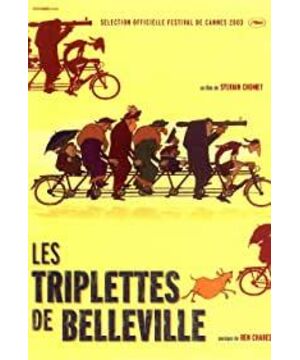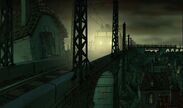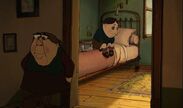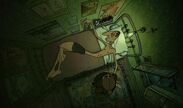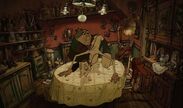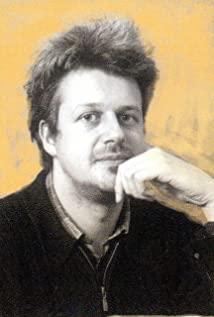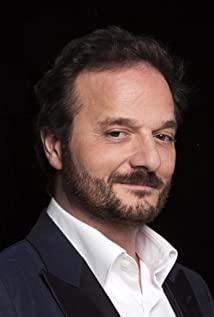"Crazy Dating Meidu" tells a somewhat absurd story.
At the beginning of the film, the bizarre urban life is presented in an exaggerated style: obese women are walking neatly, thin men with stylized smiles on their faces, as if they are props carried by women in social occasions, nightclubs On the brightly lit stage, the three sisters are praising. The picture rotates like a kaleidoscope and switches rapidly, making people feel breathless-then everything comes to an abrupt end, and we discover that this is just a TV picture of a lonely boy staring at it.
Movies are an art about situations. From the very beginning of "Meirador", two completely different situations inside and outside the TV were presented, and the two situations were completed by comparing each other: the urban life on TV is fast-paced and rich in content, but both appear to be extremely excessive. Not longing for, but scary; the life of a little boy outside TV is the opposite, slow and monotonous, but without the feeling of idyllic pastoralism, but monotonous.
The boy’s home is next to the tram tracks. The hustle and bustle of urban life is complicated and dizzying. The boy’s life is flooded with the rumbling of trams that appear regularly-this is also the life of the people in the industrial age. brand. The difference is that people living in cities do not need to think about life goals, life is always stacked with excessive content, but boys living in small towns need a goal.
In the movie, the boy doesn't like to talk, his grandmother painstakingly finds his life goal for him. Seeing that the boy is moved by the music on TV, I hope he will practice playing the piano, but the boy seems not interested in playing. Then, she found that the boy was secretly collecting reports on bicycle races, and she thought that maybe the boy likes riding a bicycle. Seeing the newly bought bicycle, the little boy's cheers strengthened his grandmother's idea. From then on, he began a hard and tedious training career as a professional bicycle racer.
The grown-up boy no longer had the joy when he saw the bicycle for the first time. Instead, he was quiet and obedient. With the mechanical whistle of his grandmother, he rode back and forth along the streets of the town.
Life outside of training is similarly monotonous. Here, the presentation of the film provides the possibility of multiple interpretations. For example, we can regard the dog raised by a boy as a symbol of a boy. The heart of a boy who always rides silently may be just like the big fat dog: Day Barking at the tram day after day, staring nervously at the clock, dreaming horrible absurd dreams... It symbolizes another level of the seemingly docile boy's mind: restlessness, confusion, exhaustion, and longing at the same time.
There is an interesting detail here. The rhythm and weight of the boy's meal are tied to a clock-like mechanism, while the dog is staring at the mechanism, waiting for the owner to finish the meal and give himself food. Here, the clock is no longer a machine designed by people for their own convenience, but has become the norm of human behavior, as some Baroque poets described: "Those cogwheels cut the days and the hours, and the fine sand flows more leaking like people. With constant blood loss, our lives are like grains of sand, trickling by..."
Life is constantly passing by these monotonous sounds: the ticking of clocks, the whistling of grandma, the howling of trains, the rubbing of bicycle chains... These sounds participate in the storytelling and give the narrative of the film. A unique rhythm, it is neither fast nor slow, nor intense nor soothing. Those voices are monotonous and boring, repetitive, endless, creating a strong sense of depression.
The boy finally went to participate in the Tour de France. But maybe (the absurd story can leave enough room for interpretation) the boy who lost the whistle of his grandmother also lost a certain inner rhythm. When he stopped to rest, he was kidnapped by the gang. From here, the story became absurd.
But the more absurd, the more freedom our interpretation can be.
The kidnapped boy and two other cyclists were fixed on a mechanical device to ride a bicycle. This is a complicated device. No matter how hard you pedal the bicycle, you can’t move, but it can record the speed. Three bicycles. The speed of the hand is the basis for gambling by the people watching the game. A video was shown in front of the drivers, as if they were moving on a small road, the monotonous scenery remained unchanged, and you didn't know whether you were moving forward or cycling. The boy stared at the image in front of him, quietly, docilely, riding the bike mechanically, without sorrow or joy, without beginning or end, as if in his heart, life has always been like this, a nightmare that will not move forward but will only be repeated.
This fixed device is like our middle-aged life. In the popular animation "Spiritual Journey" some time ago, the lost soul wanders in the land of nowhere, losing consciousness and forgetting the true nature of life. In contrast, the image in this film is much more subtle and subtle, but it makes people feel unconsciously depressed, because we all know that at a certain stage of life, it is really just a cycle, and it will never move forward. That terrible machine, along with the terrible Mafia that made him and manipulated it, does not imply the state of people under the control of industrial civilization: the future is elusive, exhausted, surrounded by urging voices, shouting for speed, efficiency, and real His life slipped through fingers like quicksand, and we felt that we had never lived but were about to die.
Fortunately, the film seems depressing, but in fact it is tender, because this is a story about salvation, about how a lonely, quiet, obedient, mechanically glaring boy was dragged out of despair.
The boy's grandmother is a pragmatist, and her love and tenderness are expressed in a powerful way. She desperately finds life goals for her grandson. If she likes music, she must learn to play the piano. If she likes bicycles, she must become a bicycle racer. To become a bicycle racer, she must complete the Tour de France. Circumstances, pragmatism applies to those who belong to the strongest. A little inattentive weakness makes people a means to achieve their goals, and they lose their place of self-existence.
But the rescue will also depend on her to complete. In the movie, the grandmother, who lost her grandson, took firm steps and whistled, leaving her pockets empty and on the road. She didn't hesitate for a moment, and she didn't have time to grieve at all, but her firm footsteps and persistent eyes seemed to say: Please don't give up on him, please don't give up on him, please don't give up on him just because he is lost. ——This is the boy's nostalgia for his grandmother. It has not been glorified, and has not been given a soft light because of nostalgia. She has never been gentle and considerate, she is strong and firm. If we must grit our teeth to complete the Tour de France, if our life must need a goal, then we need such an encourager, we need such a monotonous whistle, only the most superficial people will think that life does not require fiery tempering Practice. In real life, love and tenderness will not be expressed as soft words, mutual understanding embraces and tears of repentance. At least this grandmother’s tenderness is not like this. The pragmatic tenderness and the tough feeling of the mechanical age are very similar, but different. The thing is, boys will never be given up.
But this alone is not enough. So grandma met the three sisters. In that cold day when she lost her grandson, grandma discovered a secret: If the spokes of the bicycle tire are distorted, although it affects the ride, it can hit music.
The Three Sisters is a chorus of Crazy Mirador, the three sisters who appeared in the nightclub at the beginning of the film. At this time, their years have passed, they are living in the bottom, poverty and aging, but they are still living happily. They were attracted by grandma's music. Although grandmother discovered that bicycle tires can be used to beat music, she did not fully understand the deep meaning behind this until she saw in the home of the three sisters that the refrigerator was not used for food, the vacuum cleaner was not used for cleaning, and the newspaper was not used for cleaning. Look-they are all musical instruments. These things seem to teach grandma, and everything does not necessarily have a definite function and purpose. Things are so, and people are even more so.
The philosopher Alfred Zorn-Reiter proposed a theory about technology, "the philosophy about broken machines." He discovered that a young man on the streets of Capri put a broken motorcycle The engine is converted into a device that can make ice cream. That is to say: "This behavior contains a higher paradigm than our daily technological paradigm; when people can resist the blind and hostile automatism of machines, and learn how to apply them to unknown fields, truly The technology of humanity has just begun to appear.” Agamben thus further proposed a defunctional philosophy: “Dance shows and transforms the simple gait of the human body when walking, and the gift reveals unexpected possibilities in economic and labor life. ..."
The three sisters taught the grandmother this with their own way of life, and provided the possibility to save the lost boy.
Defunctionalization is a resistance to the industrial age, but it requires a little imagination.
In the final rescue, in that particularly absurd chase scene, the guns of the Mafia will never hit people. The weapons used by the three sisters to kill are for a while a tool for survival, and for a while they become a bomb to be thrown at the enemy; grandma's long and short script is one This kind of disability, but the heightened heel becomes a weapon at a critical moment, which can trip over the chasing car. It is this kind of imagination that makes the heavy life light, and the imagination moves the machine that binds the boy in place, and the imagination carries them to escape.
But the movie has not become tender and joking and relaxed because of this. It is still suppressed, but the joys and sorrows of life, cruelty and lightness are mixed together. In the whole process, the boy was only a rescued object, which further proved that he was the teller of this story. In those years, he was the lost person, pedaling a bicycle in pain in the cycle of magical obstacles. The boy’s meek eyes have no emotional expression, just contemplating all this in the memory, but he leads us to see all this so clearly: in fact, it is love, grandma’s love for the boy, the love of the three sisters for life, The word love seems to be very heavy, but in fact it should not be so heavy. It should be light and looming. It is the context of life, not a false phantom projected on the screen by a machine.
To remove functional philosophies, a little naivety and childishness, a little warmth and love, of course they cannot change the world. The world is still the industrialized world with tall buildings and rumbling cars, and the existence of human beings is still being squeezed. , But they can help you traverse all of this.
Through all of this, through this painful life, the middle-aged boy said like at the beginning of the film: "Grandma, the TV is over."
View more about The Triplets of Belleville reviews


